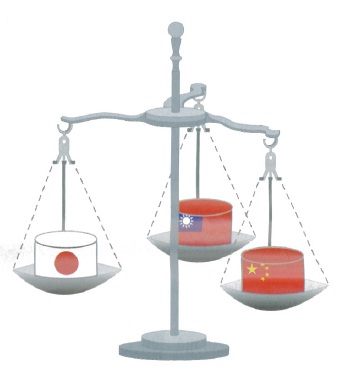Japan, Taiwan and China remain in a tenuous triangular relationship
by Laura Fumiko Keehn
The triangular relationship between Japan, Taiwan, and China has a long, and not always friendly, history. However, the currently strong economic relationship remains sturdy, even as military factors threaten to disrupt the somewhat fragile stability.
To be fair, the three nations have a long history of animosity, making any degree of peaceful cooperation an achievement. The three nations have managed to keep a tangled web of resentment and bitterness in a tenuous balance; however recent events such as the anti-Japan Beijing riots show just how easily this balance can be disrupted. In February of this year, the U.S. and Japan issued a joint statement asking for “the peaceful resolution of issues concerning the Taiwan Strait through dialogue.” This statement was the first time Japan made such a clear statement regarding the “one China” issue: China views Taiwan as a renegade state that must eventually return to China, whereas Taiwan views itself as an independent state, and refuses to return to China. Part of the triangular balance was achieved by Japan leaving the issue alone, and by clearly addressing this issue, the balance was disrupted. Not least because Japan made the statement jointly with the U.S., a move which was interpreted by many to be nothing less than a show of military power. This may or may not have set off a chain reaction of surfacing resentment resulting in the Beijing riots soon afterwards.
Michael Boyden, a British national… compares
the situation to Northern Ireland. “Neither
side will back down,” he says.
The “one China” issue between Taiwan and China is undoubtedly deeply ingrained for both countries. Michael Boyden, a British national, longtime resident of Taiwan, and managing director of the Taiwan Asia Strategy Consulting (TASC) group, compares the situation to Northern Ireland. “Neither side will back down,” he says.
Taiwan’s history is deeply intertwined with China. The island first came under Chinese Imperial rule in 1683, and over 300,000 mainlanders fled China for Taiwan in 1949, following the defeat of the Kuomintang (KMT). Taiwan became colonized by the KMT, who initially viewed their change of address as a temporary residence until they could reclaim the mainland. Though they were sometimes heavy-handed in their rule, and issues of discrimination against natives caused much resentment, Boyden explains that the KMT generally “did a good job” with the country. “Taiwan is now rich, with a very evenly spread wealth.” With the transition from KMT to the Democratic Progressive Party (DPP) ten years ago, there has been a significant change away from the “pro-unification” outlook. The DDP are less extreme in their stance, and represent a Taiwan that sees itself as an independent sovereign state, a stance that is still unacceptable for China and their “one China” policy.
The three nations have managed to keep a tangled
web of resentment and bitterness in a tenuous balance;
however recent events such as the anti-Japan beijing riots show
just how easily this balance can be disrupted.
Unlike the unfriendly relationship between Taiwan and China, Taiwan and Japan — though with a similarly long and intertwined relationship — enjoy a relatively strong and pleasant association. Japan first colonized Taiwan (as Formosa) in 1895, and the colonization was quite peaceful and mutually beneficial, as evidenced by the ongoing friendly relations between the two island nations. “It’s hard to see the relationship ever going bad,” says Boyden. Hsiao Bi-Khim, a legislator for the DPP explained to Boyden “the relationship between Taiwan and Japan is still evolving from the colonial past… but (Taiwan) looks at Japan favorably.”
However, the Chinese corner of this triangular relationship remains chilled. Taiwan views the growing military power of China as a direct threat, while the recent violent demonstrations in Beijing also make relations with Japan uneasy. This economic triangle has remained in a tenuous balance, and according to Boyden, Taiwan hopes Japan can emerge as an equalizing factor militarily, as well as economically.
This article is based on a presentation given by Michael Boyden on Jun. 21, 2005, organized by the American Chamber of Commerce in Japan.
The mission of the American Chamber of Commerce in Japan (ACCJ) is to further the development of commerce between the United States of America and Japan, promote the interests of U.S. companies and members, and improve the international business environment in Japan. Established in 1948 by representatives of 40 American firms, the ACCJ has grown into one of the most influential business organizations in Japan, with more than 3,000 individual members representing more than forty countries and 1,300 companies. For information on ACCJ membership and upcoming events, see www.accj.or.jp.









